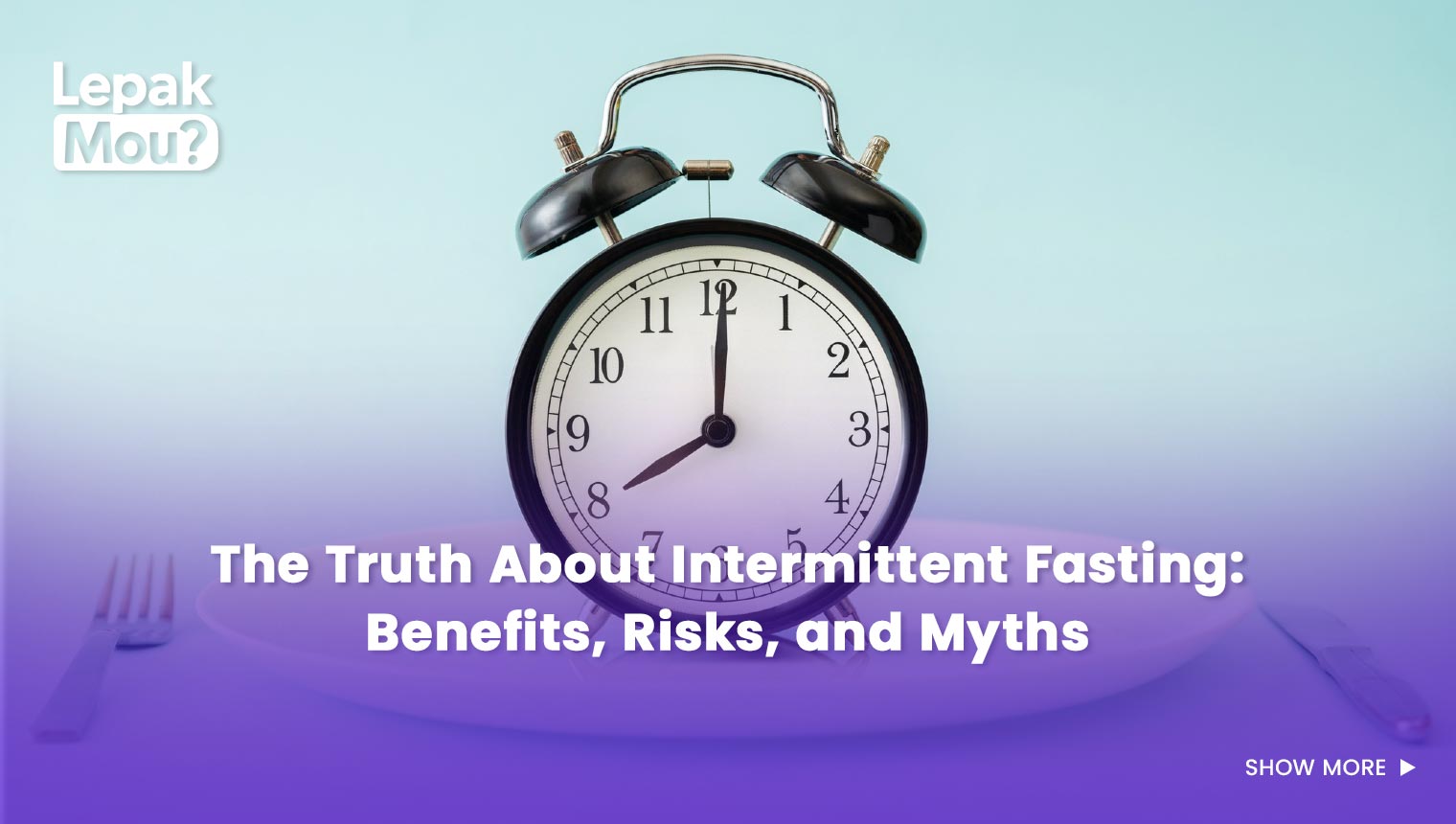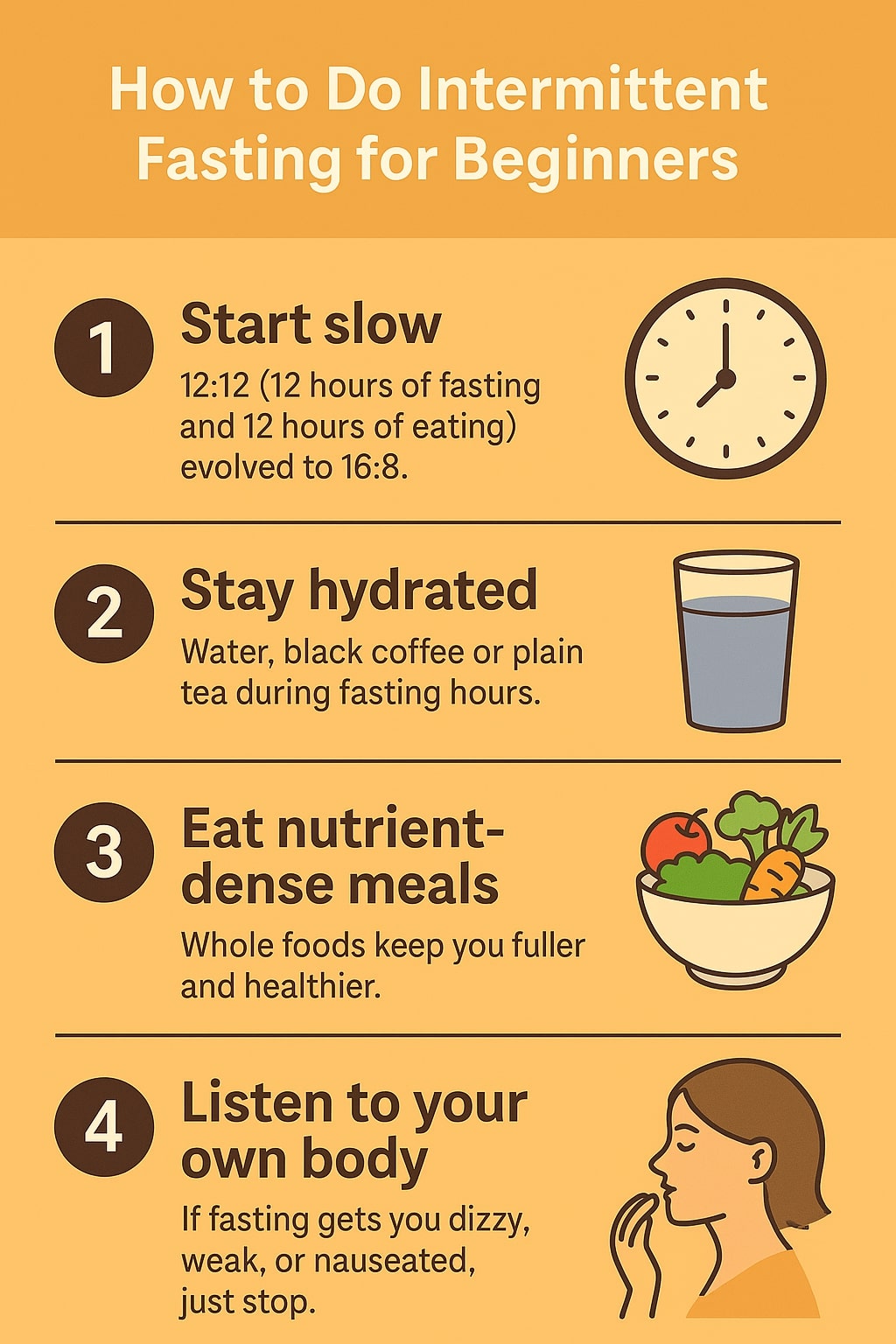The Truth About Intermittent Fasting: Benefits, Risks, and Myths

Introduction
Intermittent fasting is certainly one among the health trends most talked about across the world. Some people will swear on it as the miracle weapon for weight loss; others proclaim it gives energy, enhances focus, and slows aging.
Yet, one crucial fundamental persists: Does intermittent fasting have any effect, and, if yes, is it safe for everyone? In this article, we shall walk you through what intermittent fasting is, its various benefits, risks, myths, and how to practice intermittent fasting in the right way.
By the time you are through, you will know whether or not this eating style is suitable for you or best left behind.
Read more on this article to avoid sugary foods and drinks: Beware! Foods and Drinks That Are High in Sugar
What is Intermittent Fasting?
In terms of the most likely topic, intermittent fasting is far from a standard type of diet. Rather, it is a pattern of feeding that cycles between periods of eating and fasting.
Instead of what you eat, this puts emphasis on when you actually eat. This is unlike most forms of ‘intermittent’ diets, where calorie restrictions and food group limitations come into play. It is just timekeeping and nothing more with intermittent fasting.
The Very Popular Methods of Intermittent Fasting According to Dietitions:
- 16:8 Diet Plan: Sixteen hours of fasting and an eight hour eating window is termed the 16:8 Method.
- 5:2 Diet Plan: Five Two Diet-an individual eats normally for five days of the week, after which the individual takes low calories (ranging from 500 to 600 calories) for two days in a week.
- Alternate Day Fasting: Fasting or very much restricting food intake every other day with fasting days.
Those are patterns and not a strict “intermittent fasting diet” with complex rules. That flexibility is one of the most popular causes of intermittent fasting across the globe
Thus, the body will start switching primarily from burning glucose to burning fat for energy, according to the experts from Johns Hopkins Medicine, and that is metabolic switching and hence, how fasting works.
Now let’s find out what that means health-wise. What does that mean in terms of health? Let us investigate further.
What the Latest Evidence Says About Intermittent Fasting in 2026
In 2026, research on intermittent fasting suggests that many of its benefits are closely tied to overall calorie reduction rather than fasting windows alone. Studies continue to show that time-restricted eating and alternate-day fasting can support modest weight loss and metabolic improvements for some individuals, but results vary depending on diet quality, lifestyle, and consistency. Experts increasingly emphasise that intermittent fasting is not inherently superior to balanced calorie control and works best when paired with nutritious food choices.
Potential Benefits of Intermittent Fasting
When investigating intermittent fasting, one cannot fail to see that the growing interest is worthy of serious consideration. Research has provided evidence for some real, non-trivial benefits.
Weight Loss & Fat Burning
Perhaps the greatest attraction of an intermittent fasting regimen is weight loss. By restricting eating to a smaller window, naturally fewer calories are consumed.
But it is not just about calorie restriction. Evidence suggests that intermittent diet enhances insulin sensitivity and, in turn, enables the body to use stored fat for energy (Harvard Health).
Metabolic Health
If done correctly, intermittent fasting would offer some benefits and good metabolic health. Studies have linked fasting with better results: lower blood sugar, cholesterol level elevation, and decrease in marker of the inflammatory process.
The above may contribute to lowering the risk of type 2 diabetes, heart diseases, or even obesity.
Brain Health
The effect of fasting is not restricted to the body; it may also include influences on the brain. Preliminary studies posit that intermittent fasting might convey neuroprotective effects against diseases of neurodegeneration, such as Alzheimer’s and Parkinson’s, via a reduction in oxidative stress (National Institute on Aging).
Longevity
Studies on animals have indicated that fasting may help extend lifespan. While much human research is still in initial phases, scientists theorize that the same mechanisms may hold true for us: decreased oxidative damage and cells that can repair themselves better.
So yes, intermittent fasting serves more purposes than weight loss. But then again, so do all approaches, even when they have disadvantages.
Intermittent Fasting Risks and Side Effects
Every form of dieting brings along with itself its own side effects; so does intermittent fasting. Intermittent fasting benefits also come with some risks described below:
Hunger and Irritability
Initially, one could experience feelings of fatigue, crankiness, and cognitive blurring while fasting. The body needs time to adjust to the shorter eating intervals.
Nutrient Deficiency
If one indulges in fried foods or sugar-laden snacks during the supposed feast, one stands a chance of denying the body sufficient vitamins, minerals, and fiber outlet. It should actually include proper nutritious balanced food in your intermittent fasting schedule.
Disordered Eating
It’s unusual that an occasional diet could cause such damaged behaviors for someone with an established history with eating disorders, so professional counseling is recommended.
Not Appropriate for All
Pregnant women, diabetics, children, and patients with chronic diseases are disqualified from fasting-always, save where absolutely medically permitted. Safety always comes first.
Who Should Be More Cautious About Intermittent Fasting in 2026
Updated guidance in 2026 makes it clear that intermittent fasting is not suitable for everyone. Clinical reviews and expert commentary suggest that people with heart conditions, diabetes, blood sugar regulation issues, or a history of disordered eating should be especially cautious and seek medical advice before trying restrictive eating patterns.
There are also growing concerns that very short eating windows or highly restrictive fasting schedules may place extra stress on the body when followed long term. Because of their higher and more consistent nutritional needs, pregnant or breastfeeding individuals, children, and adolescents are generally advised not to practise intermittent fasting.
Overall, medical authorities continue to emphasise that any dietary approach — including intermittent fasting — should be chosen based on individual health needs, medical history, and long-term sustainability, rather than short-term results alone.
Some Options to Eat During Fasting
You can opt for drinks that lack calories, like water, black coffee, and unsweetened tea. Anything that contains calories breaks the fast.
Now, once you open the eating window, what you eat matters. Eating normally does not mean pizza and fried chicken every night.
Instead, nutritionists advise on patterns such as the Mediterranean diet which goes very well with intermittent fasting. Leafy green and colorful vegetables, healthy fats: olive oils, nuts, and avocados; Lean protein such as fish, poultry, legumes; complex carbs whole grains, beans, and refined ones.
Mindful eating is not about strict dieting. Intermittent fasting is better achieved when combined with wholesome meals rather than empty calories.
Read more on: Essential Healthy Staples for Weekly Meal Prep
Frequent Myths about Intermittent Fasting
Intermittent fasting involves myths. Let us debunk a few of them.
Myth 1: Fasting is starving.
Reality: In fact, intermittent fasting has different scheduled hours when an individual eats and fasts in a safe way contrary to starvation, which is uncontrolled and lacks proper nourishment.
Myth 2: Fasting slows the metabolism.
Reality: Short-term fasting will actually cause a little acceleration in metabolism. Extreme and prolonged fasting can lower it in comparison, but proper intermittent fasting diets do not do so.
Myth 3: You can eat anything during eating windows.
Reality: It is not the case. Quality matters here. Bring it as close to junk food as you want, and you aren’t seeing jack in terms of benefits with intermittent fasting.
Myth 4: Everybody must fast.
Reality: Intermittent fasting is not the choice for everyone. Some groups should avoid it without the green light from their healthcare professional.
How to Do Intermittent Fasting for Beginners

The initial days for starting IF do not need to be very complicated. A beginner-friendly approach will be:
- Start slow: 12:12 (12 hours of fasting and 12 hours of eating) evolved to 16:8.
- Stay Hydrated: Water, black coffee or plain tea during fasting hours.
- Eat nutrient-dense meals. Whole foods keep you fuller and healthier.
- Listen to your own body. If fasting gets you dizzy, weak, or nauseated, just stop.
Conclusion
Intermittent fasting is not a buzzword anymore. Scientific evidence suggests that it can bring weight loss, better metabolic health, and perhaps effects on brain function and longevity.
It is, however, not a miracle cure. There are threats from deficiency diseases, hunger, and the fact that it does not suit every individual.
At the end of the day, what works best for you will be that which you can maintain. That said, intermittent fasting very well could be part of your lifestyle-but only in a way that makes sense to both the body and the mind.
